Overview
The article outlines ten effective strategies for developing an entrepreneurial mindset, emphasizing the importance of characteristics like resilience, innovation, and risk-taking in overcoming challenges and seizing opportunities in business. These strategies, supported by statistics and case studies, highlight how structured goal-setting, lifelong learning, networking, and adaptability are crucial in fostering a mindset that thrives in entrepreneurship, enabling individuals to navigate obstacles and achieve their business objectives.
Introduction
In the dynamic landscape of career transitions, cultivating an entrepreneurial mindset emerges as a pivotal asset for individuals seeking to navigate challenges and seize new opportunities. This mindset, characterized by traits such as innovation, resilience, and a willingness to embrace risk, empowers aspiring entrepreneurs to view obstacles as stepping stones rather than hindrances.
With a significant number of entrepreneurs expressing a desire for better preparation in their journeys, understanding the nuances of this mindset becomes essential. This article delves into practical strategies for fostering an entrepreneurial spirit, highlighting the importance of:
- Goal-setting
- Lifelong learning
- Adaptability
By embracing challenges and leveraging networking opportunities, individuals can not only enhance their entrepreneurial endeavors but also pave the way for personal and financial growth. Whether one is just beginning their entrepreneurial journey or looking to refine their approach, the insights shared here are designed to inspire and equip career transitioners for success in their new ventures.
Understanding the Entrepreneurial Mindset
A business-oriented approach is fundamentally grounded in key characteristics such as innovation, risk-taking, and resilience, which are important ways to developing an entrepreneurial mindset essential for navigating career challenges, especially in a declining job market. These attributes empower individuals to perceive obstacles not as barriers but as opportunities for growth and development. For instance, 95% of business owners expressed in the 2023 Small Business Challenges report that they would embark on their journey again, underscoring the intrinsic desire to innovate despite the hurdles faced.
However, it is notable that 62% of entrepreneurs would prepare and plan better if given the chance to start over, highlighting the critical role of preparation in ways to developing an entrepreneurial mindset. Moreover, the financial setbacks encountered by 61% of LGBTQ-owned enterprises in 2020 highlight the particular difficulties faced by this community, emphasizing the importance of resilience in surmounting adversity. This way of thinking encourages individuals to venture beyond their comfort zones and fosters a proactive approach to problem-solving, which is particularly crucial for career transitioners.
Resilience enables entrepreneurs to navigate setbacks and sustain their passion amidst adversity. The importance of this perspective is particularly relevant for individuals moving into entrepreneurship, as it directly impacts the ways to developing an entrepreneurial mindset to tackle obstacles and seize opportunities in their new business ventures. As noted in ‘Your Career 2.0: A Survival Guide for The Battered Career Syndrome and Investor Syndrome,’ being informed and prepared for the realities of entrepreneurship is vital.
Furthermore, the case study titled ‘Regrets Among Entrepreneurs’ from the 2023 Small Business Challenges report shows that many entrepreneurs express a desire for better preparation, highlighting ways to developing an entrepreneurial mindset that can greatly inform those looking to transition into this field with a focus on financial freedom and personal agency. This guidebook serves as a practical resource for individuals seeking to navigate the challenges of entrepreneurship, providing insights and strategies for effective preparation and resilience.
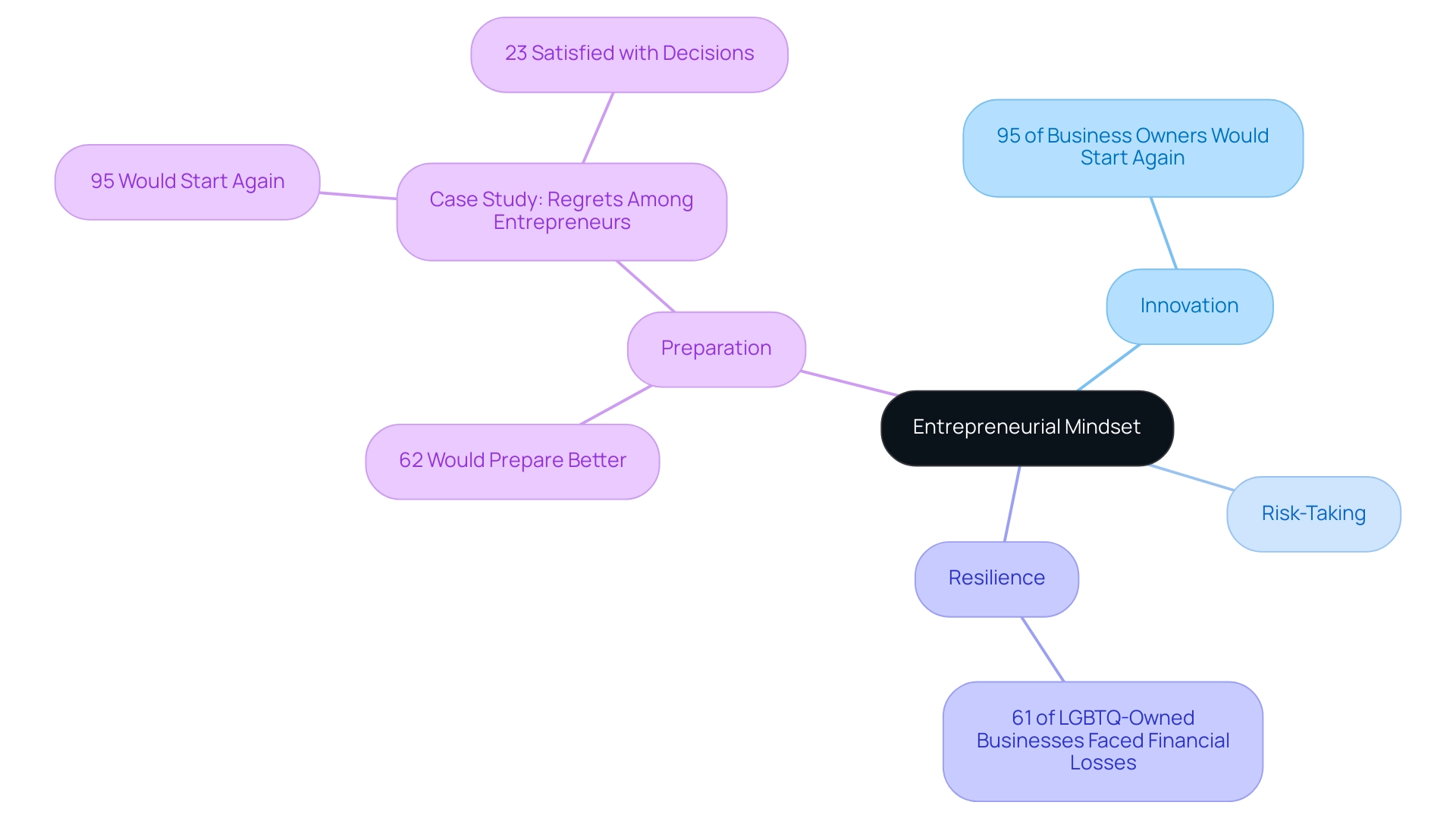
Practical Strategies to Cultivate an Entrepreneurial Mindset
-
Set Clear Goals: Establishing clear objectives is paramount in your business journey. By defining what you want to achieve, you can create a roadmap that guides your actions. Utilize the SMART framework—Specific, Measurable, Achievable, Relevant, and Time-bound—to set goals that not only provide direction but also bolster motivation. Notably, the global Objectives & Key Results (OKR) software market is anticipated to grow from $1.15 billion in 2023 to $2.98 billion by 2030, reflecting a shift towards structured goal-setting. In fact, 83% of companies recommend the OKR framework to enhance alignment and outcomes. This structured approach can significantly improve your goal-setting process.
-
Embrace Lifelong Learning: In the dynamic landscape of entrepreneurship, committing to ways to develop an entrepreneurial mindset through lifelong learning is essential. Attend workshops, read broadly, and participate in online courses that enhance your business knowledge. As Kath Kyle, leader of the Hustle-Less, Manifest-More Movement, points out,
I’ve helped thousands of customers to transform their lives and have built audiences of over 28 million people.
This highlights the transformative power of continuous education in ways to developing an entrepreneurial mindset that shapes successful entrepreneurs.
Practice Resilience: Building resilience is crucial for navigating the inevitable ups and downs of entrepreneurship. Cultivating the ability to rebound from setbacks is among the essential ways to developing an entrepreneurial mindset, enabling you to view failures not as insurmountable obstacles but as valuable learning experiences. This mindset shift can significantly impact your long-term success and adaptability in the face of challenges.
-
Seek Feedback: Regularly soliciting constructive feedback from peers and mentors can help refine your ideas and approaches. Interacting with others offers various viewpoints that can improve your decision-making process and result in better outcomes in your business efforts.
-
Take Calculated Risks: Developing a comfort level with risk is essential for entrepreneurship. Start by taking small, manageable risks and gradually increase the stakes as you build confidence. This approach allows you to learn from each experience, paving the way for more significant opportunities in the future.
-
Implement OKR Frameworks: The OKR framework, particularly beneficial for remote teams, promotes clear objectives and regular check-ins. According to a case study, 83% of companies using OKRs report significant benefits from implementing this framework. By adopting this structured approach to goal-setting, you can enhance your business effectiveness and drive your venture towards success.
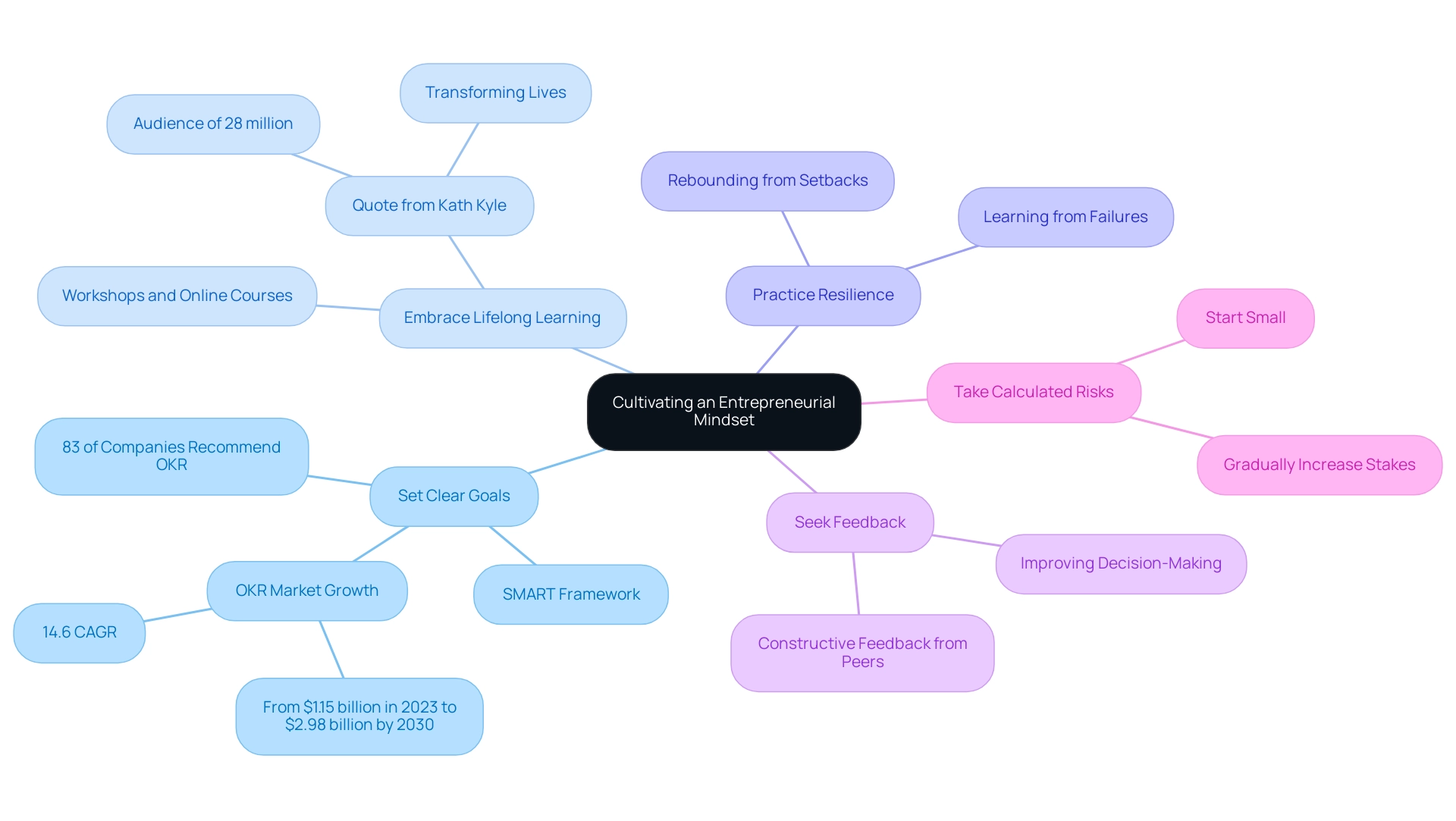
Embracing Challenges and Learning from Failure
Welcoming obstacles is a fundamental aspect of ways to developing an entrepreneurial mindset, particularly for individuals dealing with the Battered Career Syndrome and Investor Syndrome. Entrepreneurs frequently encounter obstacles that not only test their determination but also serve as critical learning moments in ways to developing an entrepreneurial mindset. By reframing these challenges as ways to developing an entrepreneurial mindset, individuals can hone their resilience and develop transferable skills vital for employability.
Statistics reveal that a staggering percentage of entrepreneurs—39%—have pursued higher education; however, it’s noteworthy that the majority do not hold a college degree, emphasizing that practical experience often outweighs formal education in the business field. Learning from failures is equally vital; identifying ways to developing an entrepreneurial mindset through a thorough analysis of what went wrong can yield invaluable insights that shape future strategies. For example, consider the journey of a startup that faced a failed product launch.
Instead of giving in to failure, the founders conducted a thorough evaluation of their errors, modified their model, and successfully entered a different market. This pivot not only salvaged their entrepreneurial dreams but also exemplifies ways to developing an entrepreneurial mindset, demonstrating how resilience and adaptability can lead to renewed success. Recent data suggests that inconsistent later-stage startups generate three times more capital during their efficiency stage compared to their scale stage, highlighting the importance of refining strategies through real-world experiences.
Furthermore, the median income for self-employed owners of incorporated small enterprises is reported at $51,816 per year, while unincorporated proprietors earn a median of $26,084. This suggests that many entrepreneurs may not achieve millionaire status, as many work side gigs or are not fully self-employed. As we transition into 2024, existing obstacles for startups continue to evolve, and these issues are closely linked to the lessons learned from past failures, which provide ways to developing an entrepreneurial mindset for future entrepreneurs to thrive.
With the insights from ‘Your Career 2.0: A Survival Guide for The Battered Career Syndrome and Investor Syndrome’, aspiring business owners learn various ways to developing an entrepreneurial mindset, which better equips them to navigate their career transitions and embrace the path towards financial freedom and personal agency. This guide provides practical strategies and tools that empower individuals by highlighting ways to developing an entrepreneurial mindset, ensuring they are well-prepared to face the challenges ahead.
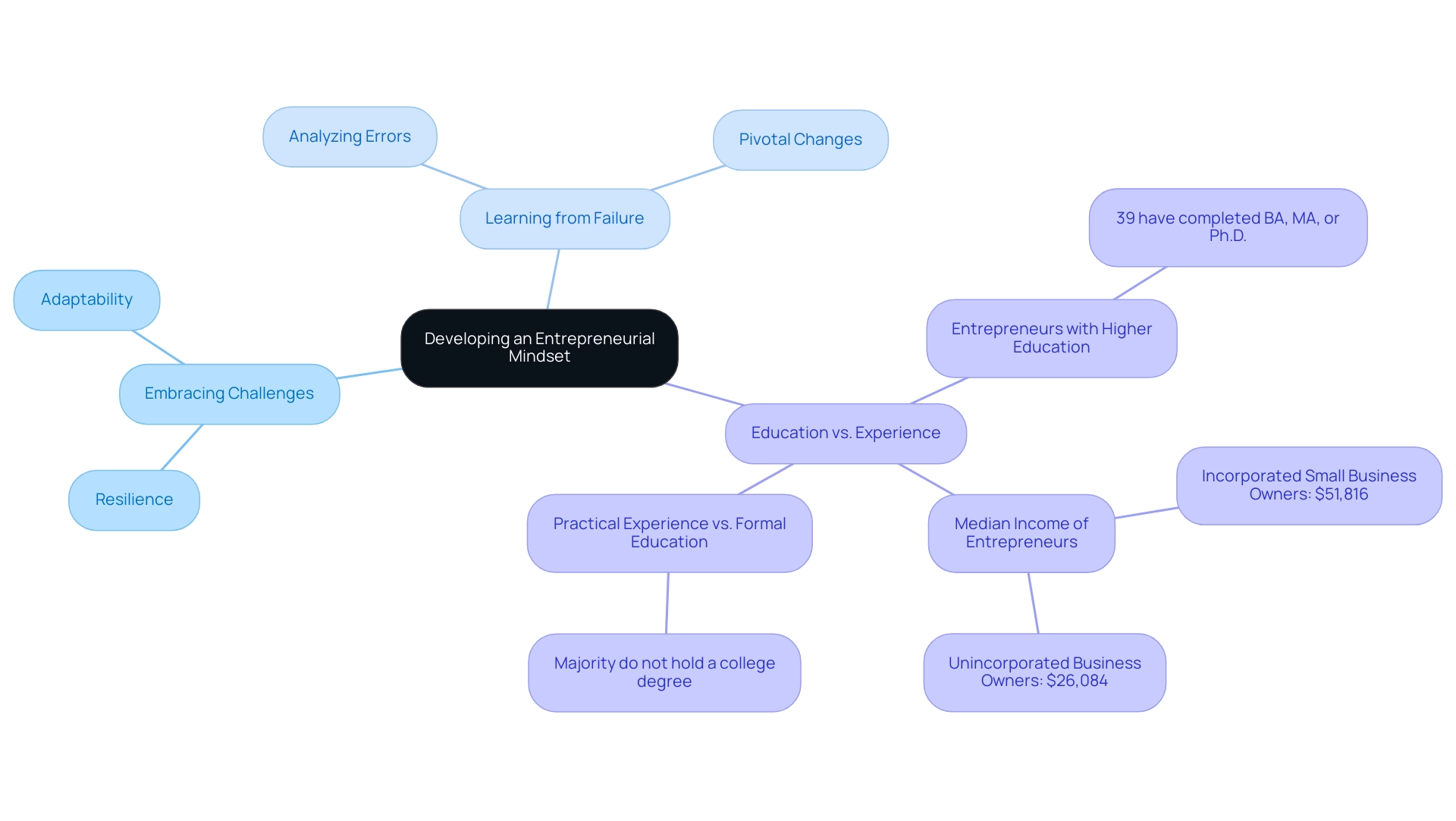
The Power of Networking and Collaboration
Networking is one of the essential ways to developing an entrepreneurial mindset, providing a wealth of opportunities for support, inspiration, and collaboration. Engaging with fellow entrepreneurs can lead to innovative ideas and solutions that may not emerge in isolation. The upcoming International Business Ownership Expo, taking place in New York City from May 30th to June 1st, 2024, is an excellent opportunity to connect with over 300 franchise brands and industry experts, directly supporting your entrepreneurial journey.
Attendees can participate in comprehensive educational seminars covering various aspects of franchise ownership, investment levels, and operational strategies, making it a valuable resource for aspiring franchise owners. Collaborations between startups can leverage each entity’s unique strengths, fostering mutual growth and success. Statistics indicate that networking is not just beneficial but also crucial:
- 66.5% of events professionals are planning to adopt hybrid formats post-pandemic, showcasing an evolving landscape for networking opportunities.
- A notable 38% of workers utilize their company’s referral programs, demonstrating the effectiveness of personal connections in career advancement.
- According to a report by Jobvite, 18% of workers secured their current positions through friends or former colleagues, underscoring the power of networking in career transitions.
This highlights the efficiency of referral hiring processes, as employees hired through referrals tend to stay longer, making networking a strategic advantage.
In-person meetings have proven to be particularly fruitful, with 40% leading to new customers, emphasizing the value of face-to-face interactions. Additionally, businesses can effectively network during the pandemic by participating in virtual events and maintaining regular online interactions, which are crucial for building connections in today’s environment. For those navigating career challenges, the book ‘Your Career 2.0: A Survival Guide for The Battered Career Syndrome and Investor Syndrome’ serves as a vital resource, offering insights into achieving financial self-sufficiency and personal agency.
Therefore, whether you attend industry events like the Expo, join entrepreneurial groups, or harness the capabilities of platforms like LinkedIn, each interaction can provide valuable ways to developing an entrepreneurial mindset, paving the way for new collaborations and innovative ventures in your entrepreneurial journey. Register today for the International Business Ownership Expo and take the first step towards finding your perfect franchise match.
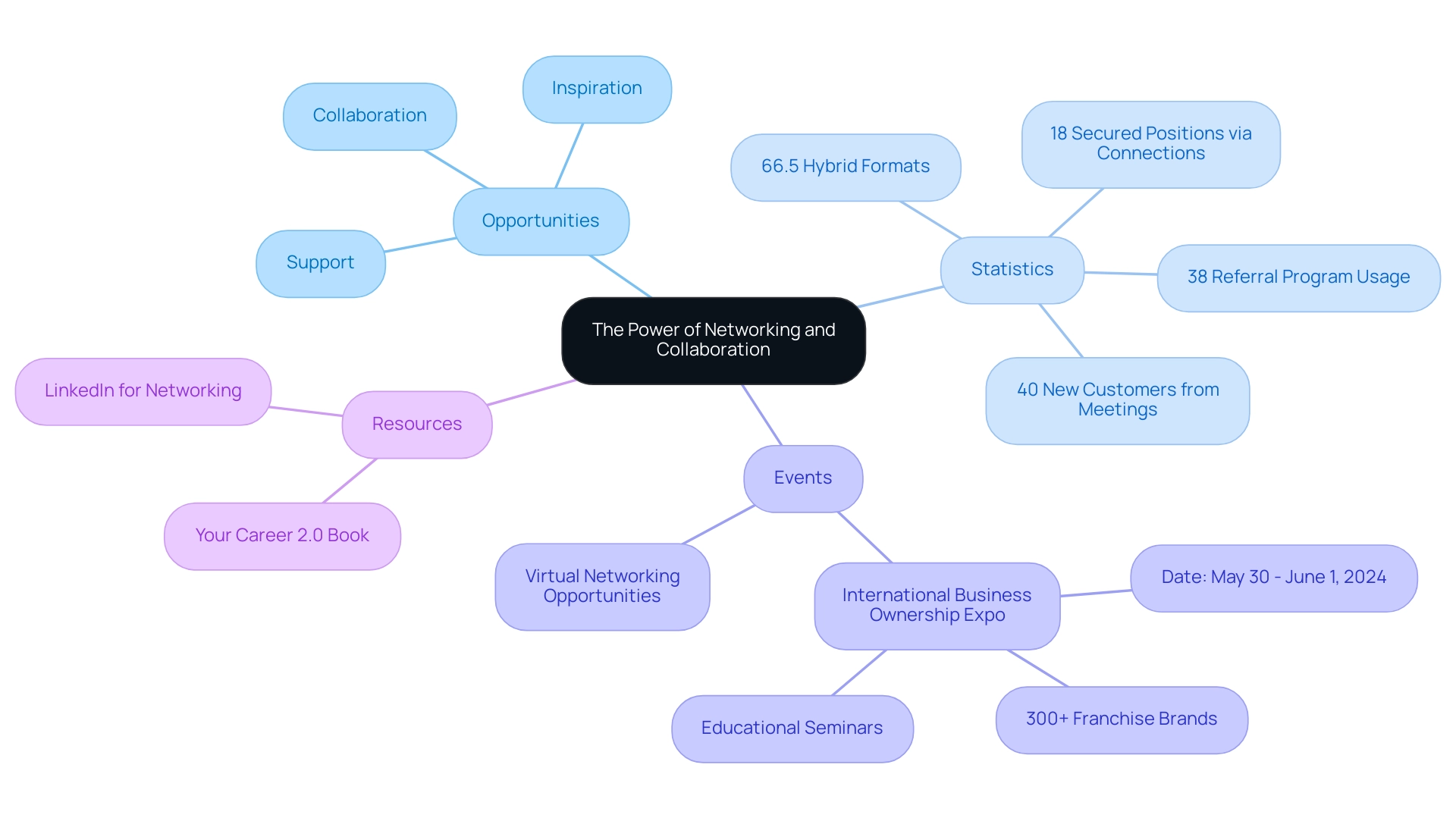
Fostering a Growth Mindset and Adaptability
A growth mindset embodies the belief that abilities and intelligence can evolve through dedication and hard work. This perspective not only nurtures resilience but also instills a passion for learning—attributes vital for entrepreneurs and ways to developing an entrepreneurial mindset while navigating the complexities of business. Engaging with educational resources, such as the insightful ‘Your Career Revolution’ podcast and the comprehensive ‘Your Career 2.0: A Survival Guide for The Battered Career Syndrome and Investor Syndrome,’ can significantly aid in overcoming doubt and clarifying business objectives.
Moreover, working with a coach can provide personalized guidance and support, helping individuals to set clear objectives and develop actionable plans. Research shows that embracing a growth perspective can improve self-efficacy and action in business. Instead of focusing on specific studies, it’s essential to understand that there are various ways to developing an entrepreneurial mindset, which can lead to improved confidence and decision-making in entrepreneurial ventures.
Furthermore, adaptability is one of the essential ways to developing an entrepreneurial mindset; the ability to pivot in response to market fluctuations or unexpected obstacles can be the difference between thriving and merely surviving. As Brian Solis aptly states, ‘As a leader, your actions set the tone for your organization. Create a safe space to ask questions, challenge conventions, and contribute crazy ideas. Consider even incentivizing it!’ This philosophy encourages openness to new ideas and approaches, highlighting important ways to developing an entrepreneurial mindset. Regularly evaluating your strategies, such as seeking feedback from mentors or adjusting your business model in response to market trends, is crucial in today’s fast-paced business environment.
A commitment to adaptability not only positions you for success but also cultivates a culture of innovation within your enterprise.
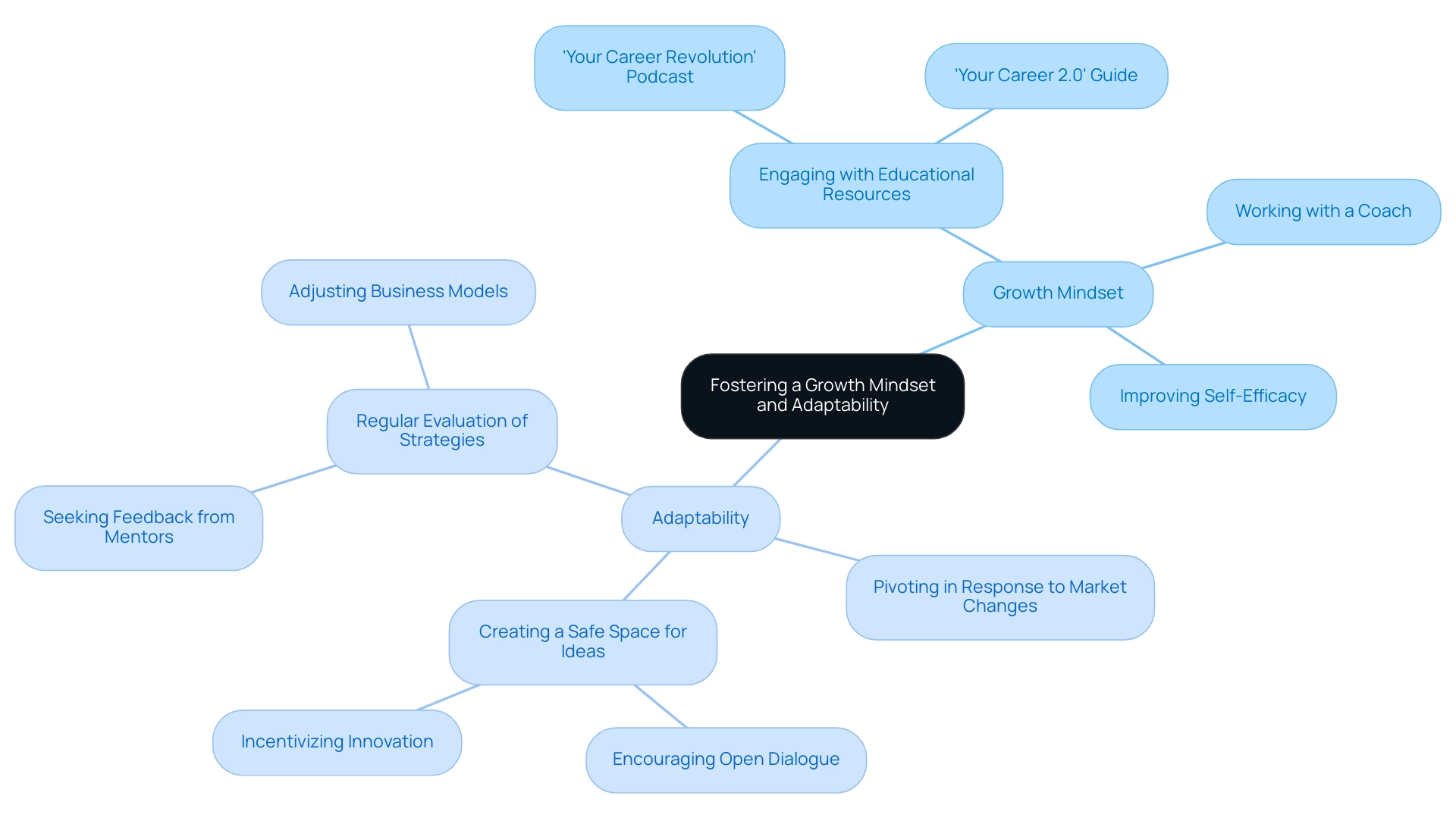
Conclusion
Embracing an entrepreneurial mindset is essential for those navigating career transitions. The journey requires a blend of resilience, innovation, and a readiness to face challenges head-on. By setting clear goals, committing to lifelong learning, and cultivating adaptability, individuals can develop the skills necessary to thrive in the ever-evolving landscape of entrepreneurship. Understanding the importance of networking and collaboration further enhances the ability to seize opportunities and overcome obstacles, transforming potential setbacks into stepping stones for growth.
Learning from failures is equally crucial, as it provides valuable insights that sharpen strategies and foster personal growth. Each challenge faced can serve as a lesson, reinforcing the idea that obstacles are not merely hindrances but opportunities for innovation and improvement. By adopting a growth mindset, aspiring entrepreneurs can remain open to new ideas and approaches, ensuring that they are well-equipped to navigate the complexities of their new ventures.
As the entrepreneurial landscape continues to evolve, the commitment to developing an entrepreneurial mindset will empower individuals to carve their own paths and achieve personal and financial success. With the right tools and strategies in place, anyone can embark on this transformative journey, embracing the challenges and opportunities that lie ahead.
Frequently Asked Questions
What is a business-oriented approach and its key characteristics?
A business-oriented approach is grounded in key characteristics such as innovation, risk-taking, and resilience, which are essential for developing an entrepreneurial mindset to navigate career challenges, particularly in a declining job market.
How do these characteristics empower individuals?
These attributes empower individuals to view obstacles as opportunities for growth and development, fostering a proactive approach to problem-solving.
What did the 2023 Small Business Challenges report reveal about business owners’ perspectives?
The report indicated that 95% of business owners would embark on their journey again, highlighting a strong desire to innovate despite facing challenges.
What is the significance of preparation for entrepreneurs?
The report also noted that 62% of entrepreneurs would prepare and plan better if given a chance to start over, emphasizing the critical role of preparation in developing an entrepreneurial mindset.
What challenges did LGBTQ-owned enterprises face in 2020?
In 2020, 61% of LGBTQ-owned enterprises encountered financial setbacks, underscoring the particular difficulties faced by this community and the importance of resilience.
How does resilience impact entrepreneurs?
Resilience helps entrepreneurs navigate setbacks and maintain their passion during adversity, which is crucial for those transitioning into entrepreneurship.
What resource is mentioned for individuals looking to transition into entrepreneurship?
The guidebook titled ‘Your Career 2.0: A Survival Guide for The Battered Career Syndrome and Investor Syndrome’ is mentioned as a vital resource for understanding the realities of entrepreneurship and developing an entrepreneurial mindset.
What does the case study ‘Regrets Among Entrepreneurs’ illustrate?
This case study highlights that many entrepreneurs wish they had better preparation, emphasizing the importance of developing an entrepreneurial mindset for financial freedom and personal agency.
What practical strategies are suggested for developing an entrepreneurial mindset?
Suggested strategies include setting clear goals, embracing lifelong learning, practicing resilience, seeking feedback, taking calculated risks, and implementing OKR frameworks.
What is the OKR framework, and how is it beneficial?
The OKR (Objectives & Key Results) framework promotes clear objectives and regular check-ins, with 83% of companies reporting significant benefits from its implementation, enhancing business effectiveness.


